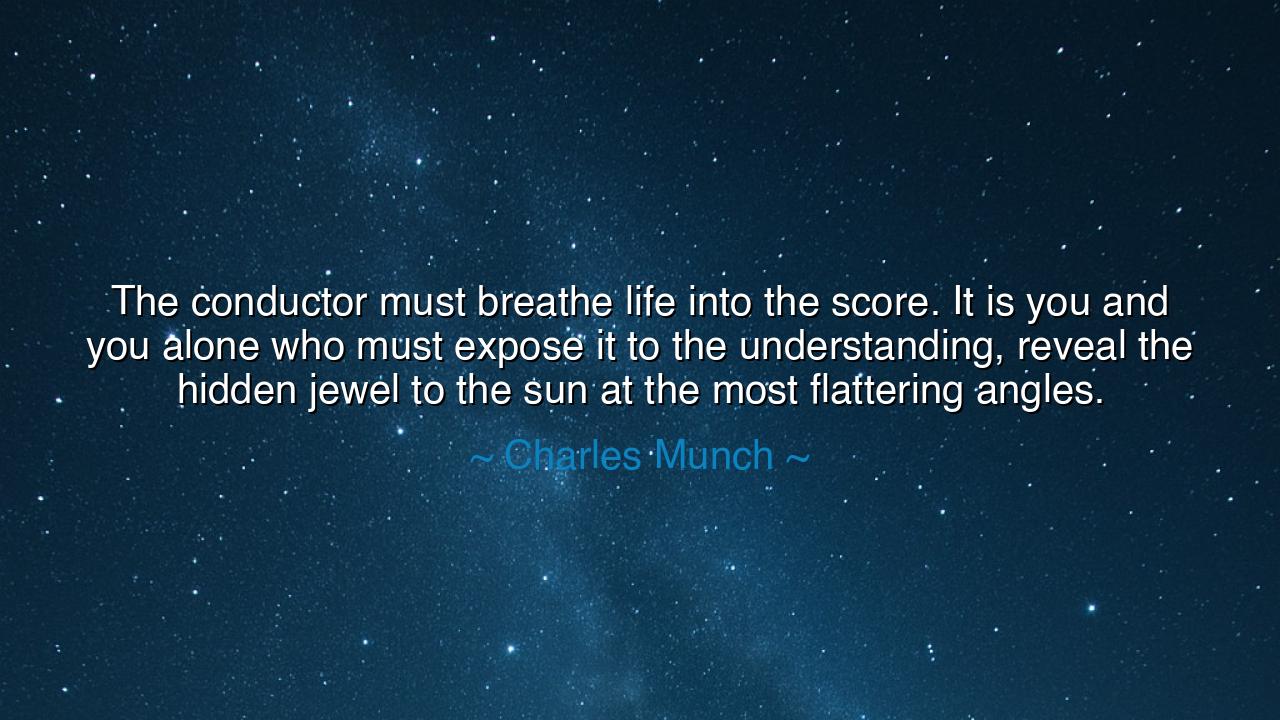
The conductor must breathe life into the score. It is you and you
The conductor must breathe life into the score. It is you and you alone who must expose it to the understanding, reveal the hidden jewel to the sun at the most flattering angles.






In the luminous words of Charles Munch, the great French conductor who lived to serve music’s soul, we find a truth that transcends the podium and reaches into the essence of all creation: “The conductor must breathe life into the score. It is you and you alone who must expose it to the understanding, reveal the hidden jewel to the sun at the most flattering angles.” In these words lies the eternal mystery of art — that creation is not complete in its making, but in its awakening. The written notes, like sleeping seeds, await the gardener’s breath; the score is silent until the living spirit gives it voice.
Munch’s wisdom comes from a lifetime spent not merely reading music, but listening to what lies between its lines — the unspoken language of intention, emotion, and eternity. The score is a map, but not the journey; it shows the terrain, but not the wind, the pulse, or the breath of life. A conductor, then, is not a machine that follows instruction, but a priest of sound, invoking the divine spark that lies buried in ink and paper. When Munch says “you and you alone,” he does not exalt the ego but the sacred responsibility: that it is the artist’s task to reveal the hidden beauty that would otherwise remain unseen.
The ancients knew this truth well. The sculptor Phidias believed that the statue already lived within the marble — it only awaited the hand that would free it. The poet Homer, blind to the world, saw within darkness the visions of gods and heroes, and gave them life with words. So it is with the conductor, and indeed with every true creator: their task is to reveal what is already there, to bring light to the jewel and show it to the sun “at the most flattering angles.” The art is not in possession but in revelation; not in commanding, but in listening deeply to what wants to be born.
Consider the story of Leonard Bernstein, who, in the 20th century, carried this same sacred torch. When he stood before an orchestra, it was as if every player, every note, every silence came alive under his gaze. He did not simply keep time — he summoned it. He could make a simple chord feel like the heartbeat of the universe. Once, when conducting Mahler, he wept openly, for he felt he had touched the composer’s soul across the gulf of death. That is what Munch speaks of — not technique, but communion, not direction, but resurrection. The conductor, like the prophet, speaks for those who can no longer speak, bringing the eternal back into motion.
But Munch’s teaching does not belong to music alone. It belongs to all who hold something lifeless in their hands and must give it breath. The teacher, who must awaken curiosity in the mind of a student; the writer, who must make words live upon the page; the leader, who must inspire motion in the hearts of the weary — all are conductors in their own way. Each holds a score, a vision, an idea — and each must find the rhythm that stirs it into life. The challenge is not to follow the notes, but to feel them; not to impose the self upon them, but to listen until the truth within them speaks.
Munch also reminds us of humility. To “reveal the jewel to the sun” is to remember that the beauty was always there — we are but the hands that lift it, the breath that clears the dust. The artist does not invent glory; they uncover it. The conductor does not create music; they awaken it from silence. The task is holy, and its reward is not applause, but the radiant moment when life itself sings through the human vessel. To create is to serve, and in that service, we find transcendence.
Therefore, my child, take this teaching into your heart: whatever your craft, breathe life into what you touch. Do not handle your work as a duty, but as a living spirit that trusts you to reveal its light. Whether you write, teach, build, heal, or lead, do it as the conductor does — with reverence, with listening, with love. For every task has within it a hidden jewel, waiting to be lifted toward the sun. Seek the right angle, the right rhythm, the right breath — and the world will shine with new radiance.
And remember, as Charles Munch taught, that you alone hold the power to awaken what sleeps within your reach. The notes are there, the marble awaits, the jewel lies beneath the dust. Take up your baton — your hand, your heart, your will — and breathe life into your creation. For in that act, you do not merely make art; you echo the work of creation itself, revealing once more the divine harmony hidden within the silence of the world.






AAdministratorAdministrator
Welcome, honored guests. Please leave a comment, we will respond soon